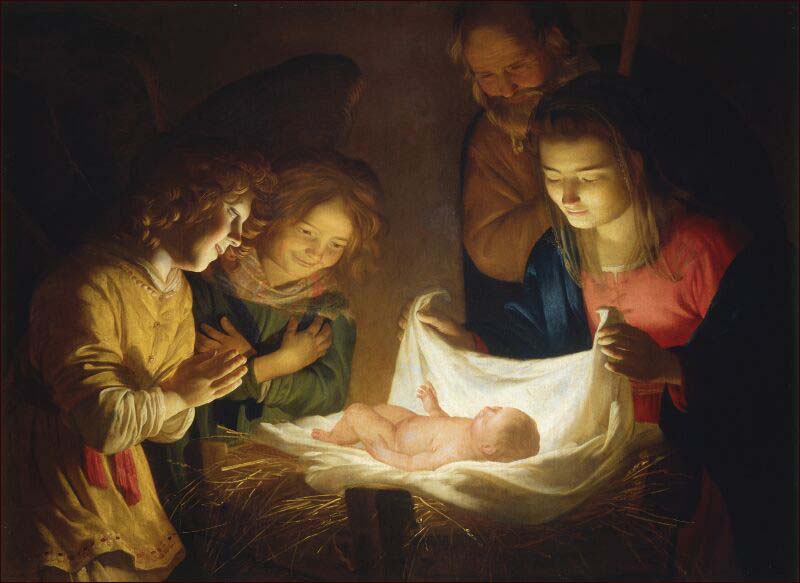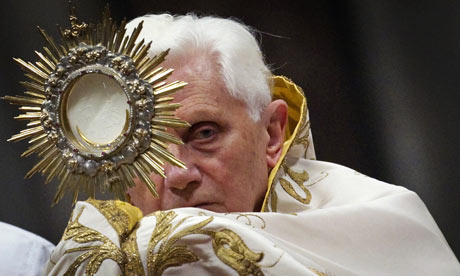The great Doctor's doctrine of predestination is often unpalatable to our modern era where a vague, superficial hope of salvation for all men without even the necessary metanoia on man's part dominates Catholic thought. The Augustinian scholar, Gerald Bonner regarded the last period of the Bishop of Hippo's life as having been a terrible mistake, preferring for him to have toned down his ever-increasing 'harshness' against the heretic Julian, in favour of a more balanced and 'compassionate' theory on such a mystery.
However uncompromising it may seem to some, the Saint's position is, for the most part at least, compatible with the Catholic Faith, regardless of the horror some may have in likening it to Calvin's.
First of all, we must state that God is under no obligation to save any man whatsoever. In creating us as Lord, He does not assume a 'moral responsibility' to man in the same sense that we have to each other. He is Lord of life and death, the Holy One in our midst. Especially as a consequence of man falling from his state of union with God, we find ourselves in a perilous situation, where hearts are hardened, evil is openly promoted and defended, and man is left with an aberrant attachment to his foul misery.
The true mystery is that He elects to save even a remnant of sinful man:
'There was one lump of perdition out of Adam to which only punishment was due; from this same lump, vessels were made which are destined for honour. For the potter has authority over the same lump of clay (Romans 9:21). What lump? The lump that had already perished, and whose just damnation was already assured. So be thankful that you have escaped! You have escaped the death certainly due to you, and found life, which was not due to you. The potter has authority over the clay from the same lump to make one vessel for honour and another for contempt...(They) have deserved nothing good; but the potter has authority over the clay, of the same lump to make one vessel for honour, and the other for contempt'
As we heard from the divine Paul on Sunday, let us rejoice for the hope to which we have been called. As so chosen, He called them, so called, He justified them, so justified, He glorified them.
Even though, as blessed Augustine states the Lord is supreme and no one may argue with his just decree, 'Who are you who argues with God?' (Romans 11:33), man's condition is far more complex than the seemingly capriciousness of God's will Who (arbitrarily) elects one man (on no basis of foreseen merit) while passivly opting out of decreeing eternal glory for another.
Man possesses a will that is free in some sense, yet severely subject to the effects of our initial apostasy from justice. But it is of Catholic Faith that we acknowledge the presence of a free will in man, which is inalienable to his constitution. Contrary to Calvin, who wrote,
'For not all are created in equal condition; but eternal life is foreordained for some, and eternal damnation for others. Therefore, as any person has been directed to one or the other of these ends, we speak of him or her as predestined to life or to death'. The later aspect of this quotation is where the error lies.
God predestines no one to eternal shame. If He truly wishes for the salvation of all, His 'desire' must exceed a 'pious hope' or sentimentality.
Yet why does He elect one man to grace, while passing over another, who like the first is in no more need of eternal damnation. Both are sinners and deserving of punishment. It may be, that God could be said to love one man more than other. We should not understand this in the sense that God comes to 'appreciate' a value of a person's actions, enticing Him to grant bliss.After all, the goodness of man only consists in the fact that He has been brought forth from nothing by the lavish mercy and goodness of God, sharing in some way in His life. If the former were true, salvation would not be considered a grace or a mercy, but a debt due to the performance of a worthy deed.
If we say that God loves one more than another, we must understand by this that He, justly and without any whim in volition, elects for one to a higher and more fitting (to a rational being) end than another. He hates nothing of His own making. However, if we wish not to err, a judgement on our part must be withheld out of reverence for His most holy decrees.
I truly believe that if God willed to bring about the salvation of man, He would do so. Surely, Stuart, you must posit the pivotal element in man, his will, for consideration? God can drag no man to heaven, His love would burn rather than console.
Certainly I consent to this interjection. Yet, as He foresees all conditions of men, their free decisions as efficient causes, the situation He places them in, the fact that nothing happens on the face of the earth that His will does not permit (or least His permissive will), we must assert that all could have been saved. Whether you assent to the position of the Thomists, Molinists or any other school, one must approbate the truth that God is sole master of the cosmos, His will being unfrustrated. The 'mode' of His salvation remains the mystery. For the Molinist, one may say that
grace becomes efficacious simply as the free will consents. We see the transition from sufficient to efficacious by the approval of the will of man. Such a view seems to have 'common sense' behind it, yet it is no more 'compassionate' in bringing more men to salvation than does, Thomism (or Augustinianism).
Or for the Thomist, the free will consents as the grace is intrinsically efficacious.
We are left with the conundrum however why God does not organise events in such a way that a person be more disposed to accepting the grace? A child brought up in the fear of the Lord, with saintly parents, a devout holy parish priest, the reception of baptism and living in a time without utter scandal in the Church, is more likely to endure faithfully to the end than the average person.
Lastly, I will insert an extract from Augustine on the issue of the so-called 'irrestible grace', which I prefer to call efficacious for the sake of not been misunderstood, or as being labelled a Calvinist. Although I have read the term 'assault' used for God's activity in approaching man, converting the will to Himself (operating grace), we must do away with any notion of 'unjustified violence' which destroys the liberty of man. On a side note, our free will is only given so that man may freely love and choose to serve the Good. Saint Thomas Aquinas states rightly, that the souls of the elect in paradise do not turn from their bliss, (unlike in Origenism, before falling to earth) as they have achieved the end they long for. The intellect was created purely for coming to know God with a joy that even surpasses all expectation.
The Doctor of Grace continues:
'Now two kinds of assistance are to be distinguished. On the one hand, there is an assistance without which something does not come about, and on the other there is the assistance by which something does come. We cannot live without food, but the fact that food is available will not keep people alive if they want to die. But in the case of blessedness, when it is bestowed on people who are without it they become perpetually blessed. Now Adam was created upright, in a state of good; he was given the possibility of not sinning, the possibility of not dying, the possibility of not losing that state of good: and in addition, he was given the assistance of perseverence, not so that by this assistance it might come about that he should in fact persevere, but because without it he could not persevere through his own will. Now in the case of the saints who are predestined to the kingdom of God by the grace of God, the assistance of perseverence which is given is not that (granted to the first man), but that kind which brings the gift of actual preseverence. It is not just that they cannot persevere without this gift;
once they have received this gift, they can do nothing except persevere.'.
Yet, one must recognise the truth that one man may come to 'salvation' temporally, then fade from the Faith and an upright life, as Ezechial says, he will die for his sins. As noted here, sufficient grace was given to Adam yet he denied himself the fruits of it.
This, I believe, is given to all men by God Who wills the salvation of all. Such is the mystery of the will and providence of God, to Whom be power and glory for ever in the Holy Church.





